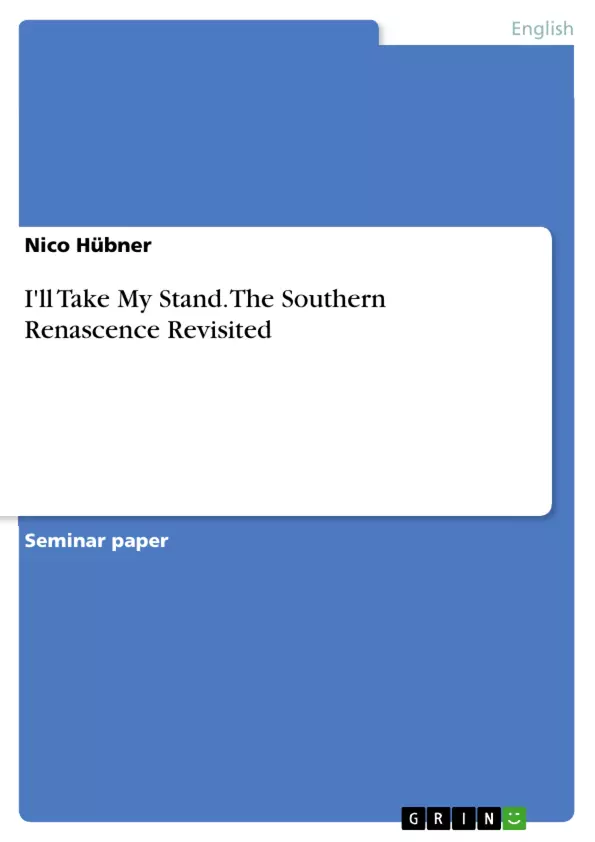After a brief recession following World War I the United States experienced a technological revolution leading to an economic boom and into an age of consumerism. This “consumer society ... did not respect inherited values or the social status quo” (Parrish x), quite to the distress of some Southern intellectuals who were “opposed to industrialism, and wanting a much simpler economy to live by ("Introduction: A Statement of Principles" xliii). These intellectuals were the Southern Agrarians, a group of twelve writers, all of whom were “well acquainted with one another” (xli), and connected to Vanderbilt University. In their manifesto I’ll Take My Stand published in 1930 they argued against industrialism and for a regress to a more conservative life, a life Southerners had lived not that long ago.
Although they published their book at the onset of the Great Depression, the roots of their movement have to be located some years earlier, as the present paper will suggest. After a brief overview of the of the Southern Renascence, the “attempt to come to terms not only with the inherited values of the Southern tradition but also a certain way of perceiving and dealing with the past” (King 7), the beginnings of this literary movement will be analyzed. In this regard, special attention is paid to Henry Louis Mencken, a journalist who, with his outspoken critique of the Southern Way of Life, triggered literary responses from the above-mentioned group.
It will further be argued, that the Southern Agrarians have their origins in the Fugitives, a group of sixteen poets who started meeting in 1915 to discuss their literary work among each other. While four of their members would also be part of the Agrarians, it will be shown that there are significant differences between the two groups.
A discussion of I’ll Take My Stand constitutes the second part of this essay. After having a look at the writers’ statement of principles, three specific qualities of their work will be analyzed, with the third giving an impetus for a rather controversial analysis of the Agrarians’ standpoint.
Finally, the last part of this work will treat once again Mencken as the first and foremost critic of the Agrarians. In this final part, not only his review of the book will be looked at, but also an essay published five years after the manifesto.
Inhaltsverzeichnis (Table of Contents)
- Introduction
- The Southern Renascence
- The Beginnings
- The Sahara of the Bozart
- The Fugitives
- The Agrarians
- The Beginnings
- I'll Take My Stand
- A Statement of Principles
- A Certain Terrain
- A Certain History
- A Certain Inherited Way of Living
- Aftermath
- A Statement of Principles
Zielsetzung und Themenschwerpunkte (Objectives and Key Themes)
This essay aims to explore the origins and development of the Southern Renascence, focusing on the Fugitives and Agrarians, and to analyze the manifesto I'll Take My Stand. The essay will also examine the critical response to the Agrarian movement, particularly that of H.L. Mencken. Key themes explored include:- The impact of the Civil War and its aftermath on Southern identity and culture.
- The rise of industrialism and consumerism in the early 20th century and its perceived threat to traditional Southern values.
- The literary and intellectual response to these changes, particularly the emergence of the Fugitives and Agrarians.
- The Agrarians' vision for a more conservative, agrarian-based Southern society.
- The critical reception of the Agrarian movement, especially the critiques of H.L. Mencken.
Zusammenfassung der Kapitel (Chapter Summaries)
The introduction provides context for the Southern Renascence, highlighting the economic and social changes in the United States following World War I and the rise of consumerism. This context sets the stage for the emergence of the Southern Agrarians, a group of intellectuals who sought to preserve traditional Southern values in the face of modernity. Chapter 1 explores the beginnings of the Southern Renascence, tracing its roots to the postbellum South and the impact of the Civil War on Southern identity. It also examines the influence of Henry Louis Mencken, a prominent journalist who was highly critical of the South. Chapter 2 focuses on the Agrarian manifesto I'll Take My Stand, outlining the group's statement of principles and analyzing three specific qualities of their work. It also examines the controversy surrounding the Agrarians' stance on race relations.Schlüsselwörter (Keywords)
The key themes and concepts explored in this essay include the Southern Renascence, the Fugitives, the Agrarians, I'll Take My Stand, Southern identity, industrialism, consumerism, agrarianism, traditional values, and the criticism of H.L. Mencken.Frequently Asked Questions
What was the manifesto "I’ll Take My Stand" about?
Published in 1930, it was a defense of traditional Southern agrarian life against the rising tide of industrialism and modern consumer society.
Who were the "Southern Agrarians"?
They were a group of twelve intellectuals and writers, mostly connected to Vanderbilt University, who advocated for conservative Southern values.
What is the "Southern Renascence"?
It refers to the literary and intellectual movement in the American South during the early 20th century that sought to re-evaluate Southern tradition and history.
How did H.L. Mencken influence this movement?
Mencken’s harsh critique of the Southern way of life (notably in "The Sahara of the Bozart") acted as a catalyst, prompting Southern writers to respond and defend their culture.
What was the link between the "Fugitives" and the "Agrarians"?
The Fugitives were a group of poets established earlier (1915); several of their members later became key figures in the Agrarian movement.
What are the controversial aspects of the Agrarians' work?
The paper analyzes the Agrarians' standpoint on race relations and their resistance to social changes, which remains a subject of critical debate.
- Quote paper
- Nico Hübner (Author), 2013, I'll Take My Stand. The Southern Renascence Revisited, Munich, GRIN Verlag, https://www.hausarbeiten.de/document/230476


